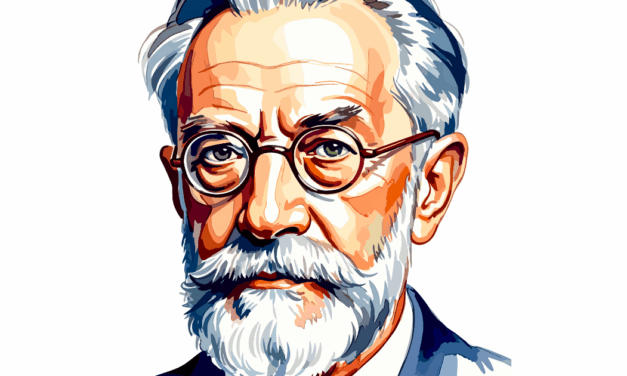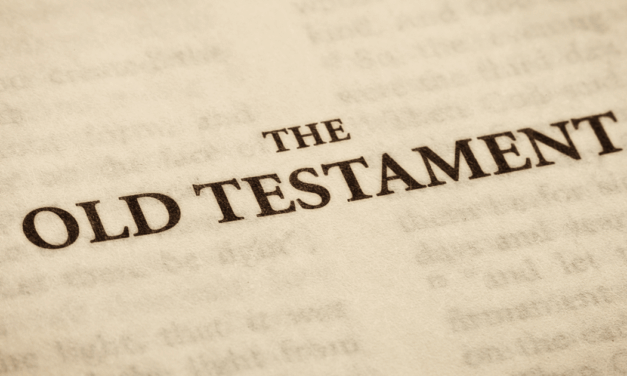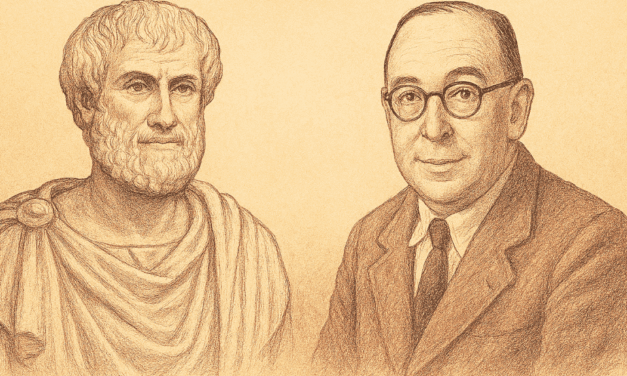Listen to this article (18:55 min)
The following article appeared as an online-exclusive in CHRISTIAN RESEARCH JOURNAL, volume 48, number 02 (2025).
When you support the Journal, you join the team and help provide the resources at equip.org that minister to people worldwide. These resources include our ever-growing database of more than 2,500 articles and Bible Answers, as well as our free Postmodern Realities podcast.
Another way you can support our online articles is by leaving us a tip. A tip is just a small amount, like $3, $5, or $10, which is the cost of a latte, lunch out, or coffee drink. To leave a tip, click here.
Why should modern Christians with a passion for apologetics and evangelism be interested in the poems of a seventeenth-century Anglican minister who ran a small parish in a remote English village far from the centers of power and influence? Unlike the other major Christian writers of his century — John Milton, who wrote the epic Paradise Lost and the tragedy Samson Agonistes; John Bunyan, who wrote the allegorical novel Pilgrim’s Progress; Thomas Browne, who wrote the deeply philosophical and theological Religio Medici; and John Donne, who wrote a heady combination of sermons, meditations, love songs, and holy sonnets — George Herbert (1593–1633) confined himself to short, lyrical, devotional poems that were not published until after his death in a collection titled The Temple.
It might seem that Herbert would be an unlikely person to turn to for wisdom on defending the faith. And yet, when the aged C. S. Lewis was asked by Christian Century to list the ten books that did the most to shape his vocational attitude and philosophy of life, he listed Herbert’s Temple rather than Paradise Lost or Pilgrim’s Progress or any of Donne’s prose or poetic works. Why is that relevant to an apologetics journal? Because to fully and effectively share the gospel with others, we must have wrestled ourselves with Christianity, not just in the spheres of reason, logic, and science, but in terms of our calling, our prayer life, and the transforming power of the gospel.
Herbert offers advice and guidance on all three in a form that pierces to heart and soul.
HERBERT WRESTLES WITH HIS CALLING
Herbert never intended to be a country parson. Born to an aristocratic family, he earned degrees with distinction from Westminster School and Trinity College, Cambridge, was elected Public Orator to the University of Cambridge, and served as a member of Parliament. His star was on the rise, and he seemed destined to be an influential man of the court. And then, at the age of thirty-three, partly due to changes in fortune, partly due to his own struggles with his calling, Herbert withdrew from the public career he had been seeking. He spent the remaining three years of his life as a rector in the hamlet of Bemerton, dying, probably of tuberculosis, just one month shy of his fortieth birthday.
And yet what a rich interior life this humble minister had! In “The Collar” and “The Windows,” Herbert provides a glimpse into the ongoing wrestling match he waged with God over the nature and purpose of his calling. If we have ears to hear, we will discover ourselves in these poems and so better understand how God uses us to proclaim the message of His truth.
Here I Am, Lord — Sort of
Although we all want to believe that when God calls us, we will answer with the “Here I am” of Abraham (Genesis 22:1), Samuel (1 Samuel 3:4), and Isaiah (Isaiah 6:8), most of us will hem and haw and hedge our bets. Herbert takes us into the mind of just such a reluctant, hesitating servant of God in “The Collar,” a poem whose title calls up, simultaneously: 1) the white collar worn by priests as an insignia of their office, 2) the yoke Jesus urges us to take upon ourselves, promising us it will be light and we will find rest for our souls (Matthew 11:28–30), and 3) anger (the meaning of the homophone “choler”).
I struck the board, and cried, No more;
I will abroad:
What? shall I ever sigh and pine?
My lines and life are free; free as the road,
Loose as the wind, as large as store.
Shall I be still in suit?
Have I no harvest but a thorn
To let me blood, and not restore
What I have lost with cordial fruit?
Sure there was wine
Before my sighs did dry it: there was corn
Before my tears did drown it.
Is the year only lost to me?
Have I no bays to crown it?
No flowers, no garlands gay? All blasted?
All wasted?1
Like Herbert’s chaotic thoughts as he fights against God’s call upon his life, the pattern of rhyme and line length is seemingly disordered and haphazard. We want to press it into a mold, make it behave, make it line up with our expectations for poetry. But it resists, as Herbert, like all of us, resists the shape to which God wants him to conform.
The opening line is quite shocking, for it suggests that Herbert is smacking his hand upon the altar, the sacred object/space before which he has been called to minister. He wants to leave the little church in the little village to which he feels bound. Is he not a free agent? Must he pine away, while the road beckons him to depart and be free? What fruit has he born? What fruit has he gained? The early hope that he would be fruitful has long been disappointed. What wine and bread he once served (as communion) and feasted on (as sustenance) has long been dried up by his own tears of frustration and despair. He has done nothing and won nothing, given nothing and achieved nothing.
The Christian who has not honestly and bravely wrestled with God and his calling as Herbert does here will have a hard time addressing the questions asked by doubters, skeptics, and seekers. It is not easy to serve a God invisible to the human eye and ear. Though God the Son entered the world as a man and now dwells forever in a resurrected body, we still do not see Him. Often, we must simply trust Him when He places us in a situation that seems to be holding us back or not fulfilling our every desire. Faith, patience, and prudence are called for.
Back from the Brink
Still, Herbert continues, like Jacob, to wrestle with God. He imagines that the fruit he yearns for lies somewhere else, and that it is up to him to reach out for it and so make up for all the pleasures he has let slip by. He will smash the bars of his cage and untie the rope that binds him to his priestly duties. On and on he rambles, continually shifting the rhyme scheme and the line lengths, piling metaphor upon metaphor in his desperation to escape.
And still, it is not enough. He cries out again that it is time for him to leave and journey, like the prodigal, to a far-off land.
Away; take heed;
I will abroad.
Call in thy death’s-head there: tie up thy fears;
He that forbears
To suit and serve his need
Deserves his load.
But as I raved and grew more fierce and wild
At every word,
Me thoughts I heard one calling, Child:
And I replied, My Lord.
He will not allow his fears of death or anything else to stop him. He will go! From now on, he will look out for number one. In fact, he will scorn anyone else who does not do the same. Yes, that is what he will do. And no one, human or divine, had better try to stop him.
And then it happens. As his rage (his choler) against his calling (his collar) reaches a fever pitch, the One who promises that His yoke (His collar) is easy and light whispers to the raving poet, bringing peace to his heart and order to the helter-skelter chaos of the poem. God does not reason him off the cliff, nor does He provide a clever five-point argument for why he must resume his clerical duties. He simply says, “My child,” and the poet responds, “my Lord.”
That is more often than not the dynamic of the Christian life. It is also the nature of reality, which cannot be reduced to a mathematical formula or a logical proof.
The Role of the Preacher
So God would have him stay, but what would He have him do? Is he really worthy, he asks in “The Windows,” to preach the word of God to his parishioners?
Lord, how can man preach thy eternal word?
He is a brittle crazy glass:
Yet in thy temple thou dost him afford
This glorious and transcendent place,
To be a window through thy grace.
It seems impossible that he, a broken, sinful man, should stand in the pulpit each Sunday and interpret the Scriptures. And yet God has set apart this sacred space for him to do just that. Indeed, He has appointed him a poet-priest to be a window through which God’s grace can shine forth upon his congregation. How can such things be?
The answer, as it turns out, is in the very metaphor with which Herbert begins his poem. He thinks of himself as brittle glass that will pervert and distort God’s word. But there is another way to read the metaphor, which Herbert does in the two stanzas that follow.
But when thou dost anneal in glass thy story,
Making thy life to shine within
The holy Preacher’s; then the light and glory
More rev’rend grows, and more doth win:
Which else shows wat’rish, bleak, and thin.
Doctrine and life, colours and light, in one
When they combine and mingle, bring
A strong regard and awe: but speech alone
Doth vanish like a flaring thing,
And in the ear, not conscience ring.
When pure sunlight is refracted through a stained-glass window, the color in the glass transforms the light into something hallowed and mysterious, provoking awe and wonder in those who gaze upon it. Even so, when the inspired light of God’s Word is refracted through the life of the preacher, it becomes richer and fuller, better able to take on flesh and bones.
Sunlight is pure, but on its own, it often appears thin and insubstantial to the human eye. In the same way, the unadorned verses of Scripture have a way of going in one ear and out the other. In the Middle Ages, when the majority of people were illiterate, the church offered a visual Bible by burning (or annealing) in glass windows stories from Genesis and the Gospels, Exodus and Revelation, Judges and Esther, and so forth. The life of the preacher functions like those stories, channeling God’s Word and making it come alive in the hearts and souls of those who look and listen.
It is good for the apologist to memorize arguments for the existence of God as it is for the evangelist to memorize the Roman Road, but they will find their ministry enhanced if they mingle both with their personal testimony, attesting to what God has done in their lives.
HERBERT WRESTLES WITH PRAYER
Herbert was a man of prayer, not only because prayer is a central part of a preacher’s job, but because he was the type of believer who meditated deeply and long upon his relationship to God. Herbert was neither rash nor impulsive, as the modern apologist and evangelist often are. He pondered every aspect of the faith, and he communed mightily with God about each one — even when God seemed to be silent. In his two sonnets “Redemption” and “Prayer (I),” Herbert resolves to go to God with his suit and ruminates over the exact nature of prayer. In both, he tries to identify just the right metaphors to capture what he is wrestling with and to convey that struggle, and triumph, to his readers.
The Landlord and the Tenant
In “Redemption,” Herbert imagines the relationship between God and man as that of a just and wealthy landlord and a failing tenant who desires a new lease.
Having been tenant long to a rich Lord,
Not thriving, I resolved to be bold,
And make a suit unto him, to afford
A new small-rented lease, and cancel th’old.
In heaven at his manor I him sought:
They told me there, that he was lately gone
About some land, which he had dearly bought
Long since on earth, to take possession.
I straight returned, and knowing his great birth,
Sought him accordingly in great resorts,
In cities, theaters, gardens, parks, and courts:
At length I heard a ragged noise and mirth
Of thieves and murderers: there I him espied,
Who straight, Your suit is granted, said, and died.
The metaphor is a vivid one, but Herbert quickly takes us by surprise by making it clear that the landlord is more than a metaphor for God; he is God, for earthly landlords do not live in heaven. Herbert then surprises us again by making it equally clear that the tenant is not some generic everyman, but is Herbert himself, the young scholar who so desired to be a man about town, visiting parks and gardens, attending the theater, and exerting his influence at court.
His petition, which is also his prayer, is at once personal and biblical. He wants to be freed from the Old Testament covenant of works — for no one can be saved by the works of the law (Romans 3:20; Galatians 2:16) — and be given in its place the New Testament covenant of grace (Hebrews 8:6–13). So things can be expressed in a sermon, but Herbert the poet renders the move from law to grace memorably concrete. When the tenant who is Herbert looks to find the landlord who is God in a mansion, he learns that this mighty lord has, like Herbert himself, abandoned the life of urban pleasure and renown. But His humble self-emptying goes further than that of Herbert. The lord who is God dwells not in the quiet village of Bemerton but in the loud, dirty, dangerous world of thieves and murderers.
Herbert’s prayer does not reach God in heaven but on the cross, the very place where his prayer is both heard and granted. God answers prayer, but at great cost to Himself. Though He is infinitely far above all petitioners, He makes Himself lower than the lowest petitioner to grant the prayer. And that prayer is the prayer in every heart, even when we cannot put words to it: to be freed from the debt we cannot pay and granted grace, mercy, and forgiveness.
The True Nature of Prayer
Our prayers are indeed heard, and by a God who stoops to our level without losing His glory or His holiness. But what is prayer? Can any metaphor capture the strangeness and mystery of an activity that all Christians participate in but few think about. In “Prayer (I),” Herbert, in his signature manner, piles metaphor upon metaphor as he goes in search of an answer.
Prayer the Church’s banquet, Angels’ age,
God’s breath in man returning to his birth,
The soul in paraphrase, heart in pilgrimage,
The Christian plummet sounding heav’n and earth;
Engine against th’ Almighty, sinners’ tower,
Reversed thunder, Christ-side-piercing spear,
The six-days’ world transposing in an hour,
A kind of tune, which all things hear and fear;
Softness, and peace, and joy, and love, and bliss,
Exalted Manna, gladness of the best,
Heaven in ordinary, man well drest,
The milky way, the bird of Paradise,
Church bells beyond the stars heard, the soul’s blood,
The land of spices; something understood.
To unpack each of the twenty plus metaphors that Herbert lists in his sonnet would require an essay of two-thousand words. Instead, I will focus on a few that open a window onto an activity that we should all devote more time to practicing and pondering.
Prayer is a dialogue with God, but one of a unique kind. When we lift our prayers to our Creator, we do so by means of the very breath He breathed into us at the beginning. By returning that spirit to its Maker, our soul comes to know itself fully and our heart journeys to the shrine for which it yearns.
We pray in humility, yet the act of prayer is a kind of violence. By it, we take heaven by storm, laying siege to God and hurling our petitions as though they were lightning bolts. Our prayers are like the spear that pierced Christ’s side, for they go right to His heart, the heart that bled and broke for our salvation.
Through prayer, God’s six-day creation is contracted into a span while heaven comes down into the ordinary life of the petitioner. Prayer is as vast as the cosmos, as rare and beautiful as a tropical bird or a perfumed island, as haunting as bells heard at a distance.
HERBERT WRESTLES WITH THE GOSPEL
Prayers are indeed strange and wonderful things, and we would do well to invite the skeptic to consider them and the God who invites us to offer them up. But even stranger and more wonderful is the transformative power of the gospel. If we can find a way, as Herbert so often found a way, to express that power and make it real, we will be more effective in our apologetics and our evangelism. In “Easter Wings” and “Love (III),” Herbert plumbs the depths of God’s love for us and how the gospel restores and reconciles us to God.
Felix Culpa
“Easter Wings” is a shaped poem, for the pattern it makes on the page illustrates what the words of the poem are trying to say. The two stanzas of the poem, when placed on their side, resemble the wings of a bird, but they also take the eye on a journey that shrinks and expands.
Lord, who createdst man in wealth and store,
Though foolishly he lost the same,
Decaying more and more,
Till he became
Most poore:
With thee
O let me rise
As larks, harmoniously,
And sing this day thy victories:
Then shall the fall further the flight in me.
My tender age in sorrow did begin
And still with sickness and shame.
Thou didst so punish sin,
That I became
Most thin.
With thee
Let me combine,
And feel thy victory:
For, if I imp my wing on thine,
Affliction shall advance the flight in me.
Though God created us good and bestowed on us every good gift, including access to the Tree of Life, we disobeyed His single command and so lost our original state of blessedness. What Herbert does in his shaped poem is render the Fall visual. The reader sees with ear and eye how the Fall caused us to decay, growing thinner in our depravity and our increased distance from God. And yet, such is the miracle of the gospel, when we were so wasted away that the breath of God seemed almost lost, Christ came and allied Himself with us. As we descended and shrank in sin, so Christ descended and shrank through the incarnation, in order that He might meet us at our lowest point and take us up with Him.
Medieval theologians beginning with Augustine spoke of the Fall as a felix culpa (Latin for “happy fault”), for our disobedience prompted God, who showed His love in creating us, to make a greater outpouring of love by taking on our flesh and joining in our humanity. Even so, the terrible events of Good Friday led to the victory of Easter Sunday. When Jesus rose bodily from the grave, conquering Satan, sin, and death in a single blow, He seized the repentant soul and took it up with Him to share in His triumph. All the mystery and paradox of that union, by which we die and rise again with Christ, is captured in Herbert’s poem.
The Invitation
It was out of supreme love for us that Christ took on our flesh and suffered the pain and indignity of the cross. But Christ did not merely save us and move on. He desires, truly desires, that we should spend eternity with Him, to be where He is, and even to be served by Him. The wildness and near incomprehensibility of that love Herbert captures in “Love (III).”
Love bade me welcome. Yet my soul drew back
Guilty of dust and sin.
But quick-eyed Love, observing me grow slack
From my first entrance in,
Drew nearer to me, sweetly questioning
If I lacked any thing.
A guest, I answered, worthy to be here:
Love said, You shall be he.
I, the unkind, ungrateful? Ah, my dear,
I cannot look on thee.
Love took my hand, and smiling did reply,
Who made the eyes but I?
Truth, Lord, but I have marred them: let my shame
Go where it doth deserve.
And know you not, says Love, who bore the blame?
My dear, then I will serve.
You must sit down, says Love, and taste my meat:
So I did sit and eat.
As he does in “The Collar,” Herbert dialogues with God, but this time his concern is not over the nature of his calling but over his worthiness to dine at the table of the Lord. So great is God’s love, however, that He gently overcomes each and every one of Herbert’s refusals and evasions.
We are guilty of sin, broken and marred, unfit to stand, much less sit, in God’s presence. But He will have us come nevertheless. He will corner us in heaven as He cornered Herbert in the little village of Bemerton. But our final home will be anything but cramped and small. It will be as spacious, as expansive as the love of God that invites us to something far greater than the paradise we lost.
Let us as apologists and evangelists dialogue with gentleness with those who feel either too good or too bad to come to Jesus. Let us, as ambassadors for Christ (2 Corinthians 5:20), invite them — on behalf of our Lord — to the wedding banquet of the Lamb (Revelation 19:6–9; cf. 22:17). And let us not hesitate to find guidance and a role model in a humble parish priest who lost the courtly life he thought he wanted, but gained in its place a calling, a rich prayer life, and a vivid understanding of the amazing grace and transformative love of God.
Louis Markos, PhD, Professor in English and Scholar in Residence at Houston Baptist University, holds the Robert H. Ray Chair in Humanities; his 26 books include Apologetics for the 21st Century (Crossway, 2010), Atheism on Trial (Harvest House Publishers, 2018), The Myth Made Fact (Classical Academic Press, 2020), and Literature: A Student’s Guide (Crossway, 2012).
NOTES
- All quotes from Herbert’s Temple are taken from George Herbert and the Seventeenth-Century Religious Poets, edited by Mario A. Di Cesare (Norton, 1978). All the poems I quote can be read for free at poetryfoundation.org. The full Temple can be read for free at the Christian Classics Ethereal Library (ccel.org).








